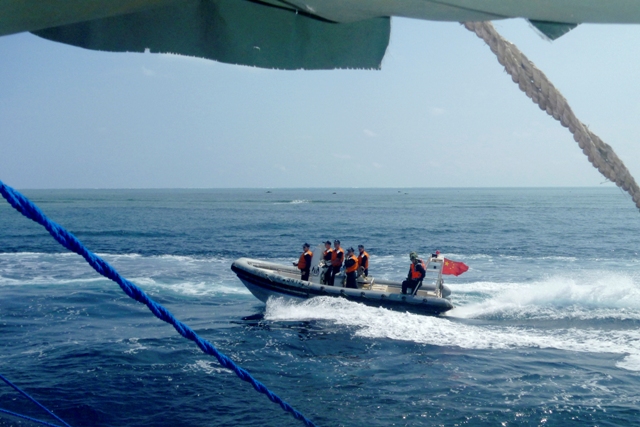International law and the promise on Scarborough Shoal

In this Oct. 27, 2015, file photo, provided by Filipino fisherman Renato Etac, a Chinese Coast Guard boat circles a Filipino fishing boat near Scarborough Shoal in the South China Sea. Renato Etac via AP, File photo
President Rodrigo Duterte has now returned from his second trip to Japan, which is the only return trip that he has made to any of the Philippines’ major partners. To recall, Duterte visited both China and Japan in October last year. Although his Cabinet officials have represented him abroad, the president himself has not yet made a return trip to Beijing. Now over a year in office, could the president be highlighting the other dimensions of his “independent” foreign policy?
The visit to Tokyo has crucial timing, as it comes very soon before the major ASEAN meetings that will be held in the middle of this month. Also in advance of those meetings, the Stratbase ADR Institute is hosting a conference entitled “ASEAN Leadership Amid a New World Order.”
The full morning of the conference will be talking about the Philippines and ASEAN’s political and security concerns. Speaking on ASEAN defense cooperation will be no less than Secretary of National Defense Delfin Lorenzana, who will be accompanied by Professor Renato de Castro, ADRi Trustee; Professor Masashi Nishihara of the Research Institute for Peace and Security (Japan); Professor Christopher Roberts of the University of New South Wales (Australia); Professor Jay Batongbacal of the University of the Philippines; Professor I Made Andi Arsana of Universitas Gadjah Mada (Indonesia) and Gregory Poling of the Asia Maritime Transparency Initiative.
Maritime disputes and security
The president’s visit to Japan in advance of the major ASEAN meetings may be an important sign of that country’s importance of Malacañang’s objectives. Japan’s new pledge of $9 billion in aid, in addition to the billions signed last year, is expected to be primarily channeled into the national infrastructure drive. Most encouragingly, the president committed to ensuring that our cooperation with Japan would be concretely implemented as soon as possible.
Just as importantly, the president confirmed that he discussed maritime security concerns, presumably including the situation in the West Philippine Sea, with Prime Minister Shinzo Abe. Upon his return to the country, Duterte reiterated his desire for China to live up to its promises not to build on Sandy Cay or on Scarborough Shoal, both of which have strategic locations inside the Philippines’ Exclusive Economic Zone. As he put it, “China has put it on record that near Pag-asa where we also have our … the Scarborough island, China has committed to us not to build anything there and I hope that they would honor that commitment to us.”
Above and beyond the immediate national security interests of our country, however, we also have the region’s interest to consider. By exercising restraint over the militarization of its existing facilities in addition to stopping its land reclamation activities, China would be showing its commitment to the general environment of trust in our region. As we already know, the South China Sea challenge has single-handedly complicated our country’s relationships with other Southeast Asian nations, with China, and with the United States. Rather than contribute to the building blocks of enduring trust, the continuing character of the problem weakens the security environment in Southeast Asia.
Back to the fundamentals
We should welcome Duterte’s statements holding China to its commitment. In addition, however, we should further encourage the Philippines to keep on this track and remind all countries of their obligations to their neighbors as enshrined in international law and their declarations with ASEAN. These documents, after all, are meant to reflect long-lasting commitments that reflect their shared principles and their shared understanding of what maintaining the region’s peace entails.
Just as there is no getting away from international law, there should be no getting away from the Philippines’ recently-won ruling from the international legal tribunal, which arguably provided all the clarity that we needed over our rights in our Exclusive Economic Zone. The international tribunal’s decision an essential piece of the puzzle in fostering the maritime security that we desire in Southeast Asia. The case not only showed that disputes can be resolved without recourse to force and in accordance with law, it has become an example for the region to lean on in understanding their own rights and responsibilities.
Dindo Manhit is the president of think tank Stratbase Albert del Rosario Institute, a partner of Philstar.com.
- Latest





























